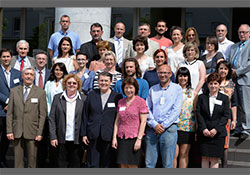From genetics to the social determinants of health – research on Roma health

WHO
On 1–3 June 2016, prominent researchers from Bulgaria, Croatia, Hungary, Romania, Serbia, Slovakia, Spain and the former Yugoslav Republic of Macedonia met at the University of Debrecen to share knowledge generated through research on Roma health and to discuss research gaps and priorities. The topics ranged from genetic/genomic susceptibility to the structural determinants of health to the evaluation of policies targeting Roma inclusion.
The meeting was entitled "Central Eastern European Networking Event of Researchers on Roma Health and Policy". It was organized by the WHO Collaborating Centre on Vulnerability and Health at the Department of Preventive Medicine, Faculty of Public Health, University of Debrecen in Hungary, in collaboration with the Division of Policy and Governance for Health and Well-being of WHO/Europe.
Improving the health of Roma: our common challenge
Dr Róza Ádány, Head of the WHO Collaborating Centre on Vulnerability and Health, opened the meeting saying, "The Decade of Roma Inclusion 2005–2015 has just ended. Despite various policy initiatives and targeted interventions, progress has been limited in tackling the adverse social and economic conditions of the Roma in countries of central and south-eastern Europe. Indirect, but substantial pieces of evidence suggest that the health status of Roma is significantly less favourable than that of the general population independent of the country in which they live."
She added, "Consequently, improving the health status of Roma is still our common challenge and concerted actions of public health researchers – which can speak to policy – are needed in the countries affected. The meeting provides a golden opportunity to share information and resources relevant for Roma health, to define future collaborative studies and interventions and thereby to support current efforts to strengthen the different components of national Roma integration strategies."
"I am impressed by the quality and variety of research on Roma health presented by the participants. Implementing the recommendations based on the evidence presented here could make a real change to the health and well-being of Roma populations and communities. Investing in Roma health research and Roma health is indeed in line with the health equity strategic objective of Health 2020 and the ambition of the 2030 Sustainable Development Agenda to leave no one behind," said Dr Piroska Östlin, Director of the Division of Policy and Governance for Health and Well-being.



